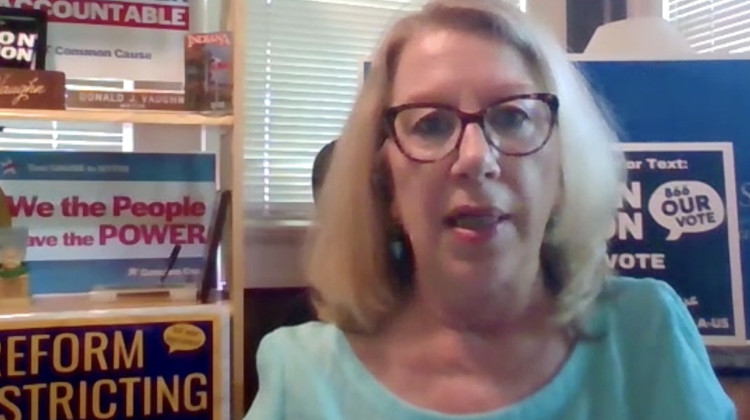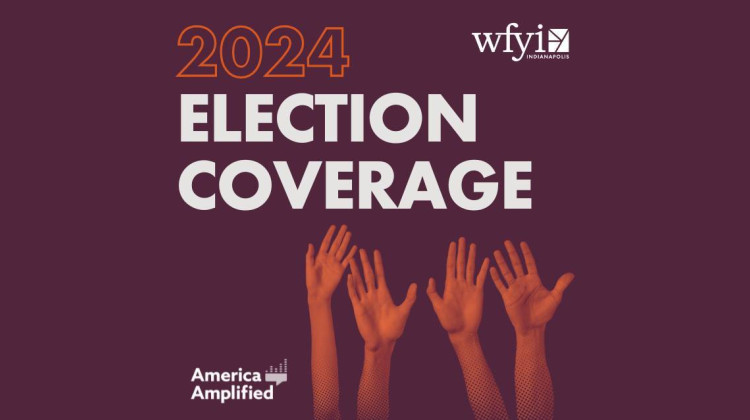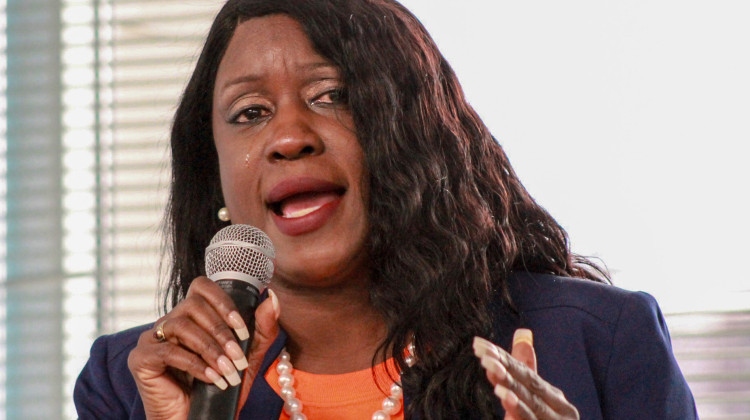Indianapolis has seen record homicides so far this year, which experts say is linked to pandemic-based stress and economic uncertainty. Since January, more than 130 people have been killed in the city compared to about 100 at this time last year. To bring us more on efforts urban areas have successfully used to decrease homicide rates, WFYI’s Katrina Pross spoke with criminal justice professor Thomas Stucky, who teaches at Indiana University-Purdue University in Indianapolis.
This interview has been edited for length and clarity.
Katrina Pross, WFYI: Crime, especially gun violence, has been on the rise in Indianapolis, and cities across the country. How does this year compare to previous years?
Professor Thomas Stucky: This year is not a good year and last year was not a good year for gun violence in the city of Indianapolis. There are some other indications actually that the violence part of crime is the area that's increasing. So if we think about things like burglary or theft, the pandemic actually reduced a lot of those opportunities for things like theft to occur, or burglaries. Property crimes tend to happen when an individual is not home so the opportunity for a burglary and theft actually went down quite a bit.
Now in terms of gun violence, it seems trite to say it, but gun violence occurs when there is a gun in the situation. So if you have two individuals, they get into a fight in a bar, and neither one of them has a gun, then obviously gun violence is unlikely to occur in that situation. Far too frequently, people have guns available to them, and they use that gun to resolve disputes. We have far too many people that feel that they need to carry a firearm for self protection, or that it's a source of strength or power.
Pross: How do the city's violence reduction efforts compare with similar efforts in other Midwest cities?
Stucky: My sense is the city of Indianapolis generally has done some pretty innovative things over the years, and it's important to really sort of keep in mind what the sort of measuring stick that you would use would be as to whether it's successful or whether it's not, this is a really difficult problem to solve. One of the things people will often focus on is what are the police doing? I'm a former police officer myself, and the police can play an important role particularly in identifying illegal firearms and getting those out of the hands of firearms out of the hands of people that should not be possessing them.
There's also what we call hotspots, where crime and violence in particular are much more common, they're occurring with more frequency. The police can play a role in identifying those areas, and really focusing their resources on that in particular. But aside from the police, and I think this is actually one of the things I think may be surprising to the average person, is that the bulk of the research tells us that the most effective strategies for preventing gun violence are actually not police related.
There are folks called violence interrupters, who are not police typically, they are individuals who can talk directly to the folks that are involved in those disputes and find ways to resolve those that don't involve violence. Typically, those programs are small, and certainly increasing them would be very valuable.
The other thing I think that we're seeing that is worth considering is the stress and conflict and trauma in general that people are experiencing from the pandemic and also from the protests, activities, all of what we're seeing in society is that the stress and conflict is higher. And in those circumstances, people's ability to resolve conflicts to handle that stress, oftentimes is lower, they may be experiencing mental health issues, which can lead to substance abuse issues, or both. Every one of those things would suggest if we have higher unemployment, that creates stress on the family. Every one of those factors actually can create additional circumstances where gun violence can occur.
As a consequence of that, one of the things that is really important is to understand the value of mental health treatment and preventative kinds of activities that are again, not police activities at all: social work, mental health treatment, substance use treatment.
The other thing that I need to add, and it's an uncomfortable topic for people to talk about, or I should say a politically charged topic, is just the availability of firearms. In the United States, regardless of how you feel about the Second Amendment, or particular policies, the reality is we have a tremendously large supply of firearms, and 2019 and 2020 were, as far as I can tell, extremely high purchase years for firearms. We have added to the firearm supply, and all else being equal, if you have more conflict, and more trauma and more firearms, you're going to see more violence. That is something that we just need to confront, is the reality is that there are a lot of people who carry firearms, and there are some of them that are going to use them to resolve disputes.
Pross: What conversations are taking place now in the academic world among people such as yourself who study crime and policing?
Stucky: The challenge with violent crime in particular and gun violence in particular is that solutions are actually pretty well known. Getting them to be implemented effectively is the challenge. So, there is actually relatively limited argument or debate about which types of policies work among the people that study this phenomenon.
I think one of the really important things to do is to consider both short term solutions and longer term solutions and oftentimes, because people are seeing something in the news, it's really problematic, and it's concerning, and politicians often tend to focus on short term solutions. The reality is that most of the effective solutions to gun violence in particular are focused really more on the long term.
We have communities where gun violence is very common and the trauma that is associated with that gun violence, I think is not very well understood, it is well understood by those who know what that means. But the general community doesn't understand the cumulative impact of what that does to a child living in in that area in that community, whether it's a direct individual and their family member has been injured, or whether it's a neighbor, or whether it's somebody in that area that trauma is is real, and it's cumulative, and it's long lasting, and so I think that's something that it's very important to understand that feeling that trauma requires intentional work. We know how to do that, it's just, again, getting the policies in place, and frankly, getting the resources. None of these solutions are free, unfortunately, but they are really important in the long run and they do pay for themselves in terms of prevention.
Pross: Domestic violence is frequently regarded as a separate category of homicide or crime, should it be - are there different strategies that are helpful particularly for domestic violence?
Stucky: I do know there are a number of really important things that domestic violence victims, or survivors can do, and what we can do to support them. I think the availability of the shelters here in Marion County, and in surrounding areas, that I do know that those folks are always looking for more resources. So certainly that would be something that I would recommend. It's a dollar well spent if someone wants to support domestic violence shelters.
The last year has been very traumatic for all of us, particularly for women who are at risk of domestic violence, this is a time when that is likely to occur more.
Back to your original quesition, I think we need much better data on domestic violence, it is like child abuse, it is one that is underreported, it occurs far more frequently than it is reported. It's something that we need much better information on. Again, there's no acceptable amount of it. But certainly there are resources available for people that are experiencing it.
I would certainly encourage people to keep aware of your friends, maintain connections with your clients, and this is actually a really important thing for everybody, believe it or not, not just for domestic violence, but sometimes that reaching out to a friend and just checking in can make a huge difference in that and so it's an interpersonal thing. But believe it or not, it can actually change someone's perspective, pretty substantially at times.
Contact WFYI criminal justice reporter Katrina Pross at kpross@wfyi.org. Follow on Twitter: @katrina_pross.
 DONATE
DONATE









 View More Programs
View More Programs

 Support WFYI. We can't do it without you.
Support WFYI. We can't do it without you.